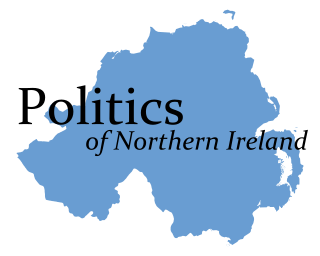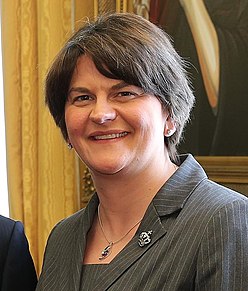Sinn Féin is a left-wing Irish republican political party active in both the Republic of Ireland and Northern Ireland.

The 1918 United Kingdom general election was called immediately after the Armistice with Germany which ended the First World War, and was held on Saturday 14 December 1918. The governing coalition, under Prime Minister David Lloyd George, sent letters of endorsement to candidates who supported the coalition government. These were nicknamed "Coalition Coupons", and led to the election being known as the "coupon election". The result was a massive landslide in favour of the coalition, comprising primarily the Conservatives and Coalition Liberals, with massive losses for Liberals who were not endorsed. Nearly all the Liberal M.P.s without coupons were defeated, although party leader H.H. Asquith managed to return to Parliament in a by-election.

The Good Friday Agreement referendum, 1998 was a referendum held in Northern Ireland over whether there was support for the Good Friday Agreement. The result was a majority (71.1%) in favour. A simultaneous referendum held in the Republic of Ireland produced an even larger majority (94.4%) in favour.

Mid Ulster is a parliamentary constituency in the British House of Commons.

The Northern Ireland general election, 1921 was held on 24 May 1921. It was the first election to the Parliament of Northern Ireland. Ulster Unionist Party members won a two-thirds majority of votes cast and more than three-quarter of the seats in the assembly. Sinn Féin in particular was shocked at the scale of the Unionist victory, having spent considerable resources on the campaign, and had expected to win between 1/3 and 1/2 of the seats. The election was conducted using the single transferable vote system.

Martina Anderson is an Irish politician from Northern Ireland who is a Member of the European Parliament (MEP) representing Northern Ireland for Sinn Féin. She became involved in the Irish Republican movement in the late 1970s, is a former volunteer of the Provisional Irish Republican Army (IRA) and was in prison for IRA activity for 13 years until she was released as a condition of the Good Friday Agreement. After her release, she became involved in politics for Sinn Féin. She was a Member of the Legislative Assembly of Northern Ireland from 2007 to 2012, representing Foyle. She served in the Northern Ireland Executive as a Junior Minister at the Office of the First Minister and Deputy First Minister from 2011 to 2012. In 2012, she became a Member of the European Parliament, and she was reelected in the 2014 election.

Pearse Daniel Doherty is an Irish Sinn Féin politician who has been a Teachta Dála (TD) for the Donegal constituency since the 2016 general election. He previously sat as a TD for Donegal South-West from 2010 to 2016. He was a Senator elected by the Agricultural Panel from 2007 to 2010.

The 2011 election to the Northern Ireland Assembly took place on Thursday, 5 May, following the dissolution of the Northern Ireland Assembly at midnight on 24 March 2011. It was the fourth election to take place since the devolved assembly was established in 1998.

The 1920 Irish local elections were held in January & June 1920 for the various county & district councils of Ireland. The elections provide an interesting barometer of opinion in Ireland during the early stages of the Irish War of Independence (1919–21), and were the last elections to be held on an all-Irish basis, with the Government of Ireland Act 1920 being passed at the end of the year, legislating for the partition of Ireland. The next local elections in Ireland were held in Northern Ireland in 1924, with the Irish Free State holding local elections in 1925.

An election to Donegal County Council took place on 23 May 2014 as part of that year's Irish local elections. 37 councillors were elected from five electoral divisions by PR-STV voting for a five-year term of office. In addition Ballyshannon Town Council, Bundoran Town Council and Letterkenny Town Council were all abolished.

An election to Dublin Corporation took place on Thursday 15 January 1920 as part of that year's Irish local elections. 80 councillors were elected from 5 electoral divisions by PR-STV voting for a five-year term of office.

An election to Londonderry Borough Council took place on Thursday 15 January 1920 as part of that year's Irish local elections.

The 2017 election to the Northern Ireland Assembly was held on 2 March 2017. The election was held to elect members (MLAs) following the resignation of deputy First Minister Martin McGuinness in protest over the Renewable Heat Incentive scandal. McGuinness' position was not filled, and thus by law his resignation triggered an election. It was the sixth election since the Assembly was re-established in 1998, and the first to implement a reduction in size to 90 MLAs.
An election to Dublin Corporation took place in March 1911 as part of that year's Irish local elections. The election saw a decline for Sinn Féin, with the Unionists regaining their position as the councils second party.

Declan Kearney is an Irish Sinn Féin politician who was elected as a member (MLA) of the Northern Ireland Assembly to represent the South Antrim constituency at the 2016 election.

Local elections are scheduled to be held in Northern Ireland on Thursday 2 May 2019 – the same day as local elections taking place in England – contesting 462 seats in all. Local elections were last held in 2014.
Elections to the Kingstown Urban District Council took place on Thursday 15 January 1920 as part of that year's Irish local elections.
The 1914 Dublin County Council election was held on Monday, 8 June 1914.
The 1920 Dublin County Council election was held on Monday, 7 June 1920.

The 1920 Antrim County Council election was held on Thursday, 3 June 1920.
















